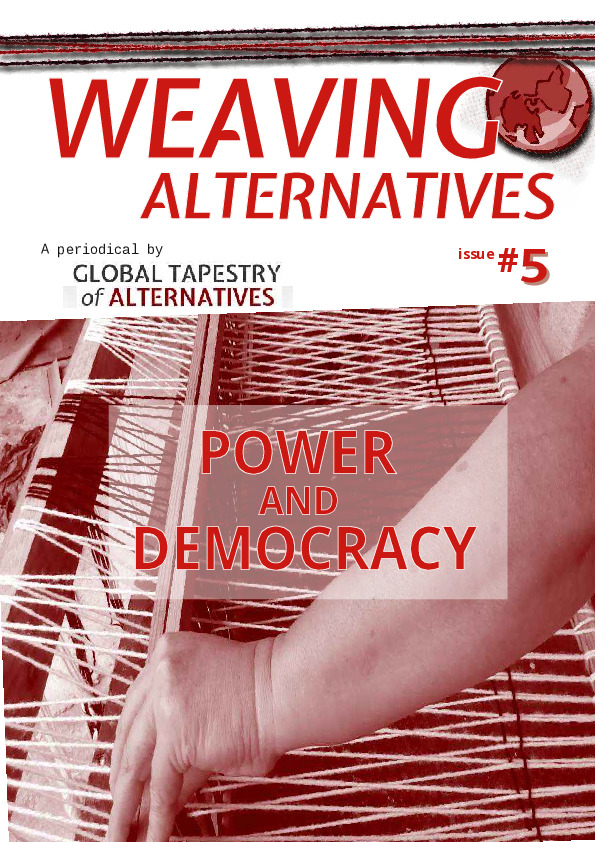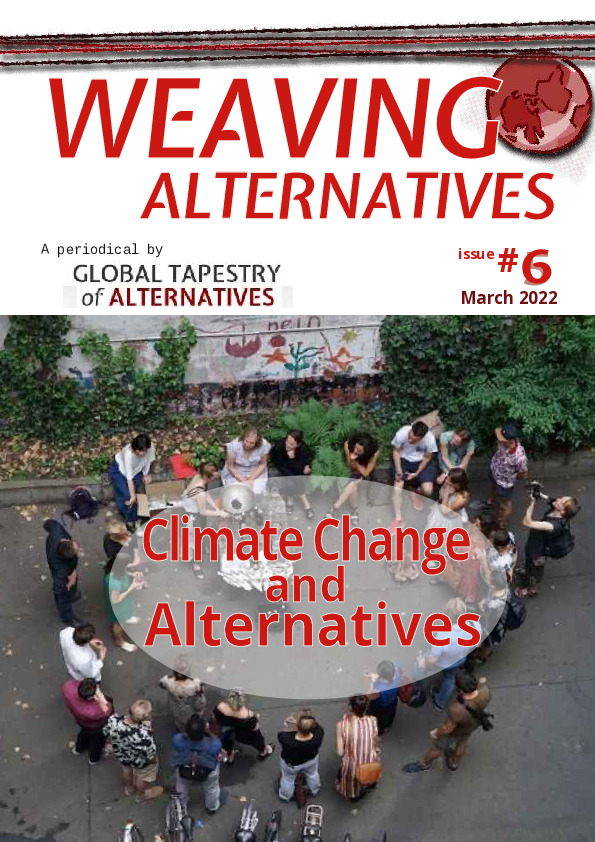Publications
Table of Contents
Publications
Reports collection
Periodically, GTA produces collections of reports that compile stories, accounts, experiences and “case studies” that emerge from the communities and processes of radical alternatives. You can access all our reports collections or specific issues below:
Stories of Regeneration and Resilience
Resilience in the Face of Covid: Pandemic series
Individual Stories
For ease of access, we have separate stories within all the reports here: stories
Periodical "Weaving Alternatives"
The original GTA's newsletter/periodical presented in a printable format:
About GTA
Global Tapestry of Alternatives: Weaving Transformative Connections (2023)
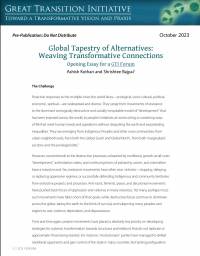
by Ashish Kothari and Shrishtee Bajpai
Abstract: Tracing the history of the Global TapestryThe weaving of networks of Alternatives of Alternatives (GTA) in the context of multiple global crises, this article goes into its objectives and processes, the main challenges it faces, and its potential to provide pathways of collaboration and solidarity that could strengthen transformations towards justice, equity, and sustainability for humans as also the earth.
Citation: Ashish Kothari and Shrishtee Bajpai, “Global Tapestry of Alternatives: Weaving Transformative Connections,” opening essay for a GTI Forum, Great Transition Initiative (October 2023), https://greattransition.org/gti-forum/global-tapestry-kothari-bajpai.
Earth Vikalp Sangam: proposal for a Global Tapestry of Alternatives (2020)
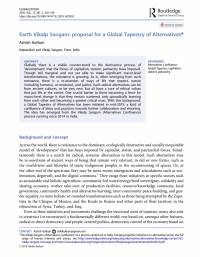 by Ashish Kothari
by Ashish Kothari
Abstract: Globally there is a visible counter-trend to the destructive process of ‘development’ that the forces of capitalism, statism, patriarchy have imposed. Though still marginal and not yet able to make significant macro-level transformations, the resistance is growing. As is, often emerging from such resistance, there is a re-assertion of ways of life that respect, nature (including humans), co-existence, and justice. Such radical alternatives can be from ancient cultures, or be very new, but all have a core of ethical values that put life at the centre. One crucial barrier to these becoming a force for macro-level change is that they remain scattered, only sporadically learning from each other and becoming a greater critical mass. With this background, a Global Tapestry of Alternatives has been initiated in mid-2019, a kind of confluence of ideas and practices towards further collaboration and visioning. The idea has emerged from the Vikalp Sangam (Alternatives Confluence) process running since 2014 in India.
Citation: Ashish Kothari (2020) Earth Vikalp Sangam: proposal for a Global Tapestry of Alternatives, Globalizations, 17:2, 245-249, DOI: 10.1080/14747731.2019.1670955. https://doi.org/10.1080/14747731.2019.1670955
New Political Horizons: Beyond The “Democratic” Nation-State
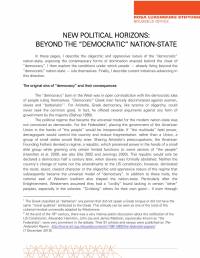 by Gustavo Esteva
by Gustavo Esteva
Abstract: In these pages, I describe the oligarchic and oppressive nature of the “democratic” nation-state, exposing the contemporary forms of domination enacted behind the cloak of “democracy”. I then explore the conditions under which people — already living beyond the “democratic” nation-state — rule themselves. Finally, I describe current initiatives advancing in this direction, introducing the GTA proposal.
Weavers
Pluritopías

Published by Crianzas Mutuas Colombia and Crianza Mutua México
The collectives and processes interwoven in Crianzas Mutuas presented in this volume, we learn from each other the relationality between sowing, eating, healing, learning, sharing the harvest, making circuits of solidarity economies and crafts from the creation of collective works. We have been creating places of de-hierarchisation of subordinating powers in order to think from the relationships and weavings between the different worlds that re-exist and keep alive their community autonomies. The intentions of our meetings, beyond the formulation of a project, have been the commitment to self-knowledge, even if we had not seen each other before; to remember together what we are and to learn mutually from the autonomous experiences that we are heading towards.
Linking People-to-People Exchange: Weaving between Alternative Development Practitioners from Southeast Asia and India

Published by MASSAMovement for Alternatives and Solidarity in Southeast Asia (South East Asia) and Vikalp Sangam
These are the proceedings of the People-to-People (P2P) Exchange 2023, entitled “Linking People-to-People Exchange: Weaving between Alternative Development Practitioners from Southeast Asia and India.” It was held on January 11, 2023 online and in the hubs of Philippines, Indonesia, and Timor Leste. The event was spearheaded by the University of the Philippines Center for Integrative and Development Studies Program on Alternative Development (UP CIDS AltDev), co-hosted by the Movement for Alternatives and Solidarity in Southeast Asia (MASSA).
Related books
Pluriverse: a Post-development Dictionary
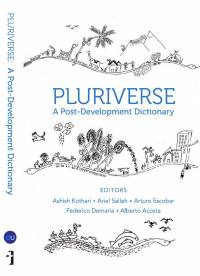 Edited by Ashish Kothari, Ariel Salleh, Arturo Escobar, Federico Demaria and Alberto Acosta
Edited by Ashish Kothari, Ariel Salleh, Arturo Escobar, Federico Demaria and Alberto Acosta
“Pluriverse: A Post-Development Dictionary” is a stimulating collection of over 100 essays on transformative alternatives to the currently dominant processes of globalized development, including its structural roots in modernity, capitalism, state domination, and masculinist values. In the post-development imagination, ‘development’ would no longer be the organizing principle of social life. The book presents worldviews and practices from around the world in a collective search for an ecologically wise and socially just world.
Download | Also available in: Spanish
Alternative Futures: India Unshackled
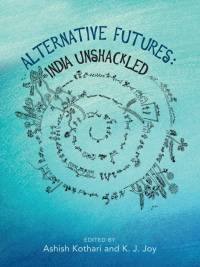 Edited by KJ Joy and Ashish Kothari
Edited by KJ Joy and Ashish Kothari
“Alternative Futures: India Unshackled” is a book that brings together scenarios of an India that is politically and socially egalitarian, radically democratic, economically sustainable and equitable, and socio-culturally diverse and harmonious. Covers a wide range of issues, organized under four sections. It explores ecological futures including environmental governance, biodiversity conservation, water and energy. Next, it envisions political futures including those of democracy and power, law, ideology, and India’s role in the globe. A number of essays then look at economic futures, including agriculture, pastoralism, industry, crafts, villages and cities, localization, markets, transportation and technology. Finally, it explores socio-cultural futures, encompassing languages, learning and education, knowledge, health, sexuality and gender, and marginalized sections like dalits, adivasis, and religious minorities.



